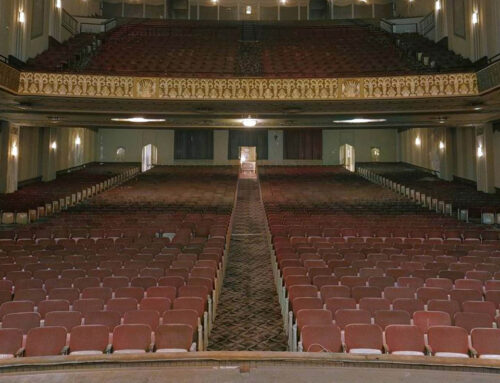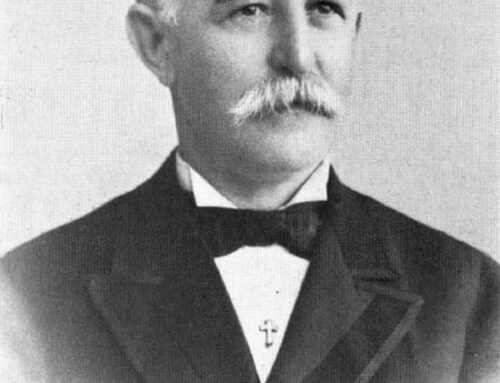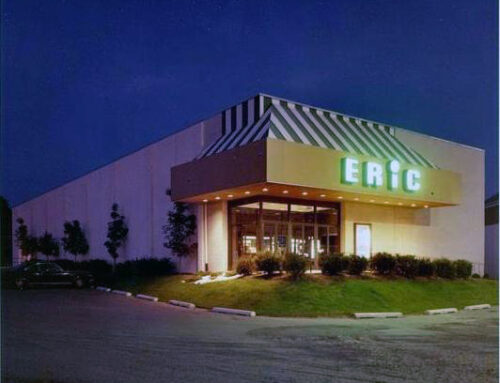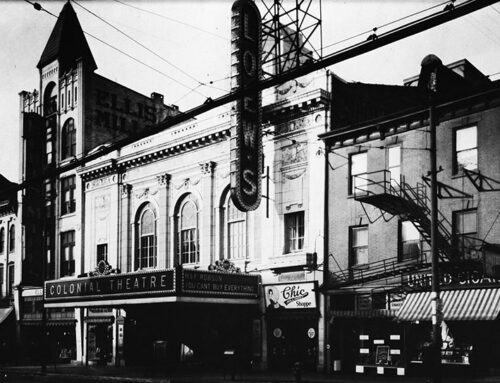The Strand Theatre was located at the Northeast corner of at 9th and Spring Streets in Reading. The city’s largest neighborhood theater was constructed by C.H. Schlegel and Son and opened on February 21, 1920. As the Reading Eagle ad of that day proclaimed, the public would now be able to see “the best attractions produced without taking the time to dress up and go downtown.”
A Carr and Schad theatre, the Strand contained 1,750 seats and, in its early years, featured motion pictures, vaudeville, and stage attractions. The Haage Concert Series was also moved to this theatre when the Rajah burned in 1921. On September 21, 1925, Paul Whiteman and his band opened their transcontinental tour at the Strand with vocalist Morton Downey. An ad for the theatre in the October 3, 1925 edition of the Eagle boasted of three performances of vaudeville and pictures featuring Dunbar and Turner in slapstick and conversation that will “make the house rock” and Buster Keaton in the feature film, “The Navigator.” Even greater still was the attraction scheduled for the following week – the Mason Brothers gigantic stage play, “Uncle Tom’s Cabin.” The Strand’s stage was also the setting for many benefit programs. Elmer Quinn remembers playing there for the Billy Levan Orchestra which was performing to raise funds for Mississippi flood relief.
On May 3, 1926, this Ninth and Spring film house, along with other theatres in the Carr and Schad chain, was taken over by Ben Amsterdam and Louis Korson. The Strand again changed hands in 1930 when Warner Brothers acquired control, continuing its operation until May 1941 when the theatre reverted to H.J. Schad who undertook a complete renovation. On May 29, 1941, Schad’s Strand reopened with the feature film, “Men of Boy’s Town,” starring Spencer Tracy and Mickey Rooney. The manager appointed by the new owner was Paul Esterly.
Below: The Strand Theater, 1931.


Over the years, the Strand was to have many managers, including Earl Hinkle, Clayton Evans, and Bluma Madeira, but those who loved this neighborhood picture palace with its distinctive huge box office rarely knew the name of the manager. However, they knew that the Strand was the placc to go on a balmy summer evening to escape not only the heat but also the reality of life by buying a fifty-cent ticket to a thrilling double feature like “Rear Window” with Jimmy Stewart and Grace Kelly and “North By Northwest” starring Cary Grant. The Strand was where people went on a cold December evening, leaving early enough to sip a steaming cup of coffee at the Strand Restaurant to warm their bones before strolling over to the brightly-lit theatre to warm their hearts with the melodic crooning of Bing Crosby in “White Christmas.” Reading High School cheerleaders cheered on the stage of the Strand at the school’s athletic awards programs and employees of Wyomissing Industries sang Christmas carols in its auditorium at company holiday parties.
Below: The Strand Theater, 1948.

In 1956 this neighborhood film house changed hands again when the William Goldman chain purchased it, along with the Astor, from Schad. Unfortunately, television already had a stranglehold on the American public who seemed hypnotized by the little picture box which sat blinking in their living rooms. In an effort to woo back this fickle public, the Goldman chain booked Hollywood blockbusters like “Around the World in 80 Days” whose success can be seen by the seating reservation form which appeared in the January 19, 1958, edition of the Eagle. Goldman continued to draw the neighborhood crowds during the sixties by playing double features starring such favorites as Shirley MacLaine and Dean Martin. Gary Cooper, and Paul Newman. Thus, the Strand remained a viable part of the neighborhood until February 23, 1970, when tragedy in the form of fire struck down the old movie house. On that date, the Reading Eagle headline blared “Nine Companies Respond to Two Alarms” and as the newspaper reported, the destruction was extensive, with the heaviest damage occurring in the balcony and rear portion of the theatre. The entrance lobby and theatre proper also sustained water and smoke damage. The fire, reported at 6:29 A.M. by a passerby, was believed to have started in the concession area, and by the time firemen arrived, thick, acrid smoke, whipped along by high winds, enveloped Spring Street. According to the account in the Reading newspaper, manager Bluma Madeira, visibly shaken by the conflagration, was led away in tears. Her brother, Clayton Evans, manager of the Astor, recounted that part of the movie house had been recently renovated. This renovation included a lobby roof, refurbished rest rooms, and repaired rear walls. Three teenagers were later arrested for starting the blaze.
Another fire of suspicious origin hit the Strand on August 11,1974, when juvenile investigators were called in to investigate three fires which occurred early that Sunday. The other arson targets were the Reading Y.M.C.A. and the company’s Outer Station. The search centered on a teenager who was seen near the Strand at the time of the 7:01 A.M. blaze and was a suspect in all three fires which were ignited by a flammable liquid. This suspected arson damaged the stage and rear portion of the movie house which had been purchased by Fox Theater Management Corporation for $60,000 in January 1973 from Budco-Goldman Theaters, Inc. which had purchased the Strand from William Goldman Theaters, Inc. in 1972. This beloved neighborhood film landmark would never recover from these devastating fires.
In April 1975 the theatre was razed to make way for another of the ubiquitous golden arches of the McDonald’s fast food chain. But those who loved this Ninth and Spring movie house knew that a treasured piece of their existence was gone, for the Strand, with its huge, brightly-lit marquee, its spacious auditorium, and its unique style, was one of a kind.
Below: The Strand Theater Fire, 1975.


Below: The Strand Theater Demolition, 1975.






Leave A Comment